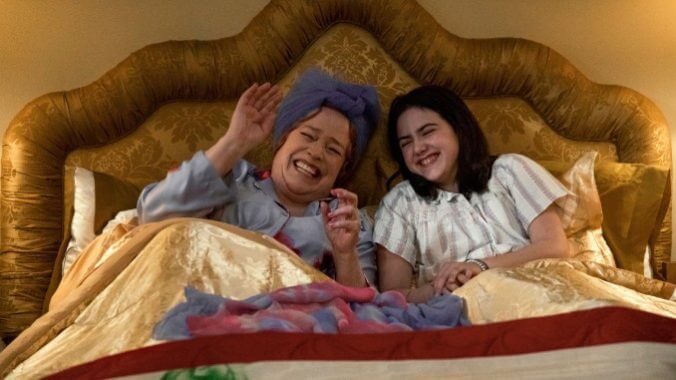
Are You There God? It’s Me, Margaret Is Rated PG-13 for Mentioning Menstruation. Are You Kidding Me?
Did you know Are You There God? It’s Me, Margaret is rated PG-13?
A PG-13 rating means “Parents Strongly Cautioned. Some Material May Be Inappropriate For Children Under 13.”
I went into the screening positively perplexed by what content the movie could have that would be deemed inappropriate for children under 13. Were there things about the book that I read multiple times as a child that I had forgotten? I left the screening absolutely flabbergasted by its rating.
Are You There God? It’s Me, Margaret is an utter delight. There is no nudity. No swearing that I can recall. No violence. No drugs. The official reason, according to the press materials, is “thematic material involving sexual education and some suggestive material.”
Ah. Periods. It’s rated PG-13 because it talks in an honest and often hilarious way about menstruation. Are you kidding me? Something half the population gets somewhere between the ages of nine and 16 is the reason the movie gets the same rating as the upcoming The Boogeyman and Fast X?
But let’s back up. Are You There God? It’s Me, Margaret by the prolific and cherished author Judy Blume was first published in 1970. Generations of young girls grew up reading the novel, which not only provided a blueprint of what to expect as adolescence approached but also validated the rollercoaster wave of emotions that accompany puberty. Talk to adult women who have read it and they remember dog-eared passages they read repeatedly. They recall passing the book around during a slumber party while nervously giggling. And they fondly remember how much the novel was a part of their childhood—how much Margaret meant to them, how much they saw themselves in Margaret.
In the book, 11-year-old Margaret struggles with her family’s move from New York City to the New Jersey suburbs. At the cusp of adolescence, she desperately wants to grow up. To get breasts. To get her period. To have her parents stop treating her like a little kid. She’s also wrestling with the fact that, since her mother is Christian and her father is Jewish, they’ve decided to raise her without religion. They think she can decide what she wants to be or doesn’t want to be when she grows up.
The movie—written and directed by Kelly Fremon Craig, and starring Abby Ryder Fortson as the titular character, Rachel McAdams as Margaret’s mother Barbara, Benny Safdie as her dad Herb and Kathy Bates as her feisty grandmother Sylvia—is delightfully true to the beloved novel. I so appreciated that, like the book, the movie was set in the 1970s before social media and cell phones. During a time when teens didn’t communicate almost exclusively in emojis and acronyms. Because the truth is that while the world surrounding teens has certainly changed in the last 50-plus years, puberty and the angst of being 11, 12 and 13 is pretty much the same as it always was. This story resonates no matter what decade it’s set in.
This version of Are You There God? It’s Me, Margaret arrives at a critical time. Maybe today’s tween and teens don’t read Blume’s books with the same voraciousness as I did (my tween daughter is much more interested in books about dragons and warrior cats). Maybe information about the onset of adolescence is more readily available to them via a simple Google search. But my daughter is living in a country with fewer rights than I had growing up. In addition to the overturning of Roe v. Wade and the utterly horrific things that are happening across the country in regards to reproductive care and women’s health care, Florida Republicans passed a bill last month banning any kind of education about menstruation until the sixth grade. Why in the year 2023 are periods still considered something to be ashamed of? Something that has to be kept a secret? I honestly have no idea, but the PG-13 rating from the MPAA makes me believe Florida Republicans aren’t alone in their perspective.
Margaret is a charming movie which brings to life all the pivotal moments I remember from reading the book, particularly the “we must, we must, we must increase our bust” chant Margaret and her friends Nancy (Elle Graham), Janie (Amari Alexis Price) and Gretchen (Katherine Mallen Kupferer) recite on an almost daily basis in the hopes of getting something to fill the bras they were so anxious to purchase. Things reach a crisis point for Margaret when Barbara’s estranged parents, who basically disowned their daughter when she married Herb, come to visit, and Sylvia decides to make a surprise appearance. One set of grandparents want Margaret to go to church. The other wants her to go to temple. This issue is not resolved by the end of the movie, leaving it as one Margaret must navigate as she grows up. That’s a real truth about growing up: Lots of life’s problems don’t come with easy solutions.
The movie looks at three distinct generations of women trying to find themselves and forge a new path. The movie begins with Barbara excitedly telling Margaret that she’s not going to work anymore and she’ll be able to be home more. It ends with her returning to teach art lessons, responding “I would love to but I don’t want to,” when asked to do more volunteer work. (That is a phrase I need to work into my everyday vernacular.) When Margaret’s family moves, Sylvia is lonely and finds herself without a purpose, making to-do lists that have things like “dust” and “crossword puzzle” on them. It ends with her going to Florida, making new friends and creating a new social life for herself. And the final moment finds an overjoyed Margaret finally (finally!) getting her period. The movie’s ending is a new beginning for Margaret, capping a timeless story, beautifully told and more important than ever—no matter the rating. Period.
Amy Amatangelo, the TV Gal®, is a Boston-based freelance writer and a member of the Television Critics Association. She wasn’t allowed to watch much TV as a child and now her parents have to live with this as her career. You can follow her on Twitter (@AmyTVGal).






























































